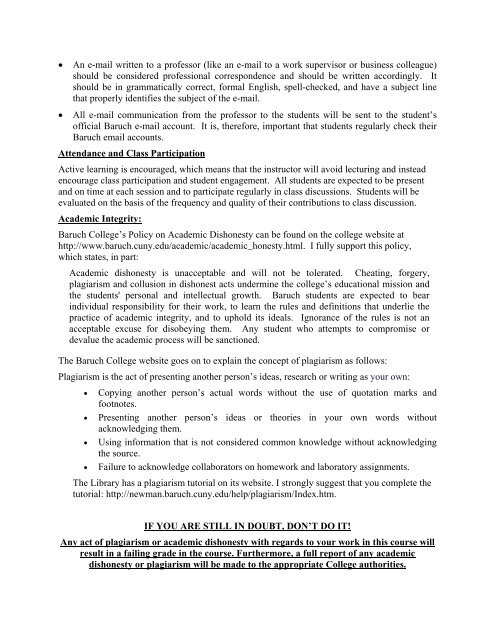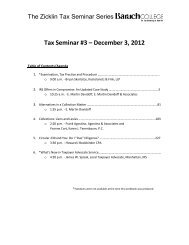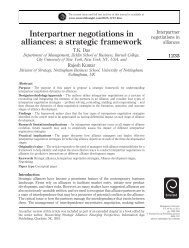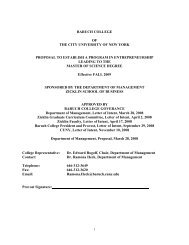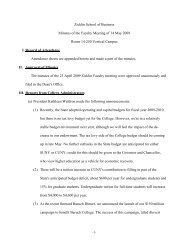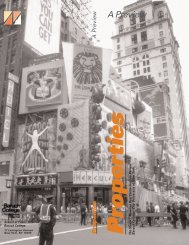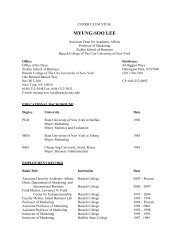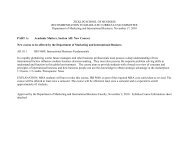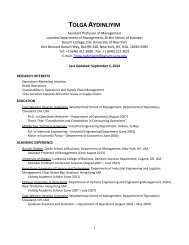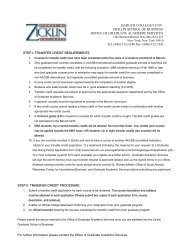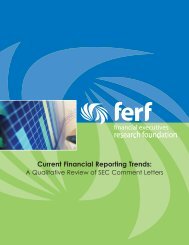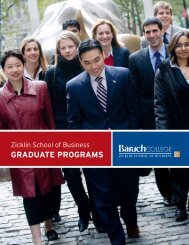Graduate Curriculum Committee - zicklin : school of business - CUNY
Graduate Curriculum Committee - zicklin : school of business - CUNY
Graduate Curriculum Committee - zicklin : school of business - CUNY
You also want an ePaper? Increase the reach of your titles
YUMPU automatically turns print PDFs into web optimized ePapers that Google loves.
• An e-mail written to a pr<strong>of</strong>essor (like an e-mail to a work supervisor or <strong>business</strong> colleague)<br />
should be considered pr<strong>of</strong>essional correspondence and should be written accordingly. It<br />
should be in grammatically correct, formal English, spell-checked, and have a subject line<br />
that properly identifies the subject <strong>of</strong> the e-mail.<br />
• All e-mail communication from the pr<strong>of</strong>essor to the students will be sent to the student’s<br />
<strong>of</strong>ficial Baruch e-mail account. It is, therefore, important that students regularly check their<br />
Baruch email accounts.<br />
Attendance and Class Participation<br />
Active learning is encouraged, which means that the instructor will avoid lecturing and instead<br />
encourage class participation and student engagement. All students are expected to be present<br />
and on time at each session and to participate regularly in class discussions. Students will be<br />
evaluated on the basis <strong>of</strong> the frequency and quality <strong>of</strong> their contributions to class discussion.<br />
Academic Integrity:<br />
Baruch College’s Policy on Academic Dishonesty can be found on the college website at<br />
http://www.baruch.cuny.edu/academic/academic_honesty.html. I fully support this policy,<br />
which states, in part:<br />
Academic dishonesty is unacceptable and will not be tolerated. Cheating, forgery,<br />
plagiarism and collusion in dishonest acts undermine the college’s educational mission and<br />
the students' personal and intellectual growth. Baruch students are expected to bear<br />
individual responsibility for their work, to learn the rules and definitions that underlie the<br />
practice <strong>of</strong> academic integrity, and to uphold its ideals. Ignorance <strong>of</strong> the rules is not an<br />
acceptable excuse for disobeying them. Any student who attempts to compromise or<br />
devalue the academic process will be sanctioned.<br />
The Baruch College website goes on to explain the concept <strong>of</strong> plagiarism as follows:<br />
Plagiarism is the act <strong>of</strong> presenting another person’s ideas, research or writing as your own:<br />
• Copying another person’s actual words without the use <strong>of</strong> quotation marks and<br />
footnotes.<br />
• Presenting another person’s ideas or theories in your own words without<br />
acknowledging them.<br />
• Using information that is not considered common knowledge without acknowledging<br />
the source.<br />
• Failure to acknowledge collaborators on homework and laboratory assignments.<br />
The Library has a plagiarism tutorial on its website. I strongly suggest that you complete the<br />
tutorial: http://newman.baruch.cuny.edu/help/plagiarism/Index.htm.<br />
IF YOU ARE STILL IN DOUBT, DON’T DO IT!<br />
Any act <strong>of</strong> plagiarism or academic dishonesty with regards to your work in this course will<br />
result in a failing grade in the course. Furthermore, a full report <strong>of</strong> any academic<br />
dishonesty or plagiarism will be made to the appropriate College authorities.


